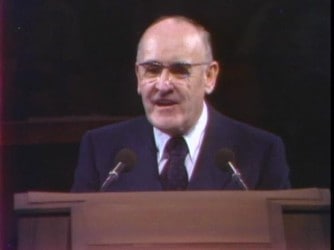From [the] majestic world of spirits we enter the grand stage of life to prove ourselves obedient to all things commanded of God. During mortality we grow from helpless infancy to inquiring childhood and then to reflective maturity. We experience joy and sorrow, fulfillment and disappointment, success and failure. We taste the sweet, yet sample the bitter. This is mortality. Then to each life comes the experience known as death. None is exempt. All must pass its portals. To most, there is something sinister and mysterious about this unwelcome visitor called death. Perhaps it is a fear of the unknown which causes many to dread its coming . . . [The Savior’s] words to the grieving Martha and to His disciples today bring comfort to us:” ‘I am the resurrection, and the life: he that believeth in me, though he were dead, yet shall he live.”
Thomas S. Monson
| “Mrs. Patton – the Story Continues,” Ensign, November 2007, pp. 22-23
Topics: Being Spiritual & Spirituality, Jesus Christ, Maturity, Mortality, Resurrection, Spirit(s)


